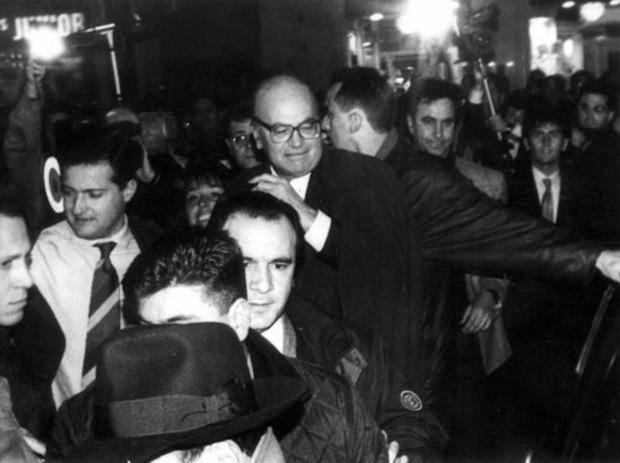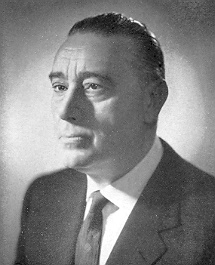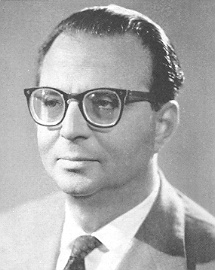|
Tangentopoli
(; ) was a nationwide judicial investigation into political corruption in Italy held in the early 1990s, resulting in the demise of the First Italian Republic and the disappearance of many political parties. Some politicians and industry leaders committed suicide after their crimes were exposed. Antonio Di Pietro was the main judicial figure in charge of the investigation. In some accounts, as many as 5,000 public figures fell under suspicion. At one point, more than half of the members of the Italian Parliament were under indictment, while more than 400 city and town councils were dissolved because of corruption charges. The estimated value of bribes paid annually in the 1980s by Italian and foreign companies bidding for large government contracts reached United States dollar, US$4 billion (6.5 trillion Italian lira, lire). The corrupt system uncovered by the investigation was referred to as ''Tangentopoli'' (). The term derives from Italian ''tangente'', which means "Kickback ... [...More Info...] [...Related Items...] OR: [Wikipedia] [Google] [Baidu] |
Christian Democracy (Italy)
Christian Democracy (, DC) was a Christian democratic political party in Italy. The DC was founded on 15 December 1943 in the Italian Social Republic (Nazi-occupied Italy) as the nominal successor of the Italian People's Party (1919), Italian People's Party, which had the same symbol, a crusader shield (''scudo crociato''). As a Catholic-inspired, centrist, catch-all party comprising both centre-right and centre-left political factions, the DC played a dominant role in the politics of Italy for fifty years, and had been part of the government from soon after its inception until its final demise on 16 January 1994 amid the ''Tangentopoli'' scandals. Christian Democrats led the Italian government continuously from 1946 until 1981. The party was nicknamed the "White Whale" () due to its huge organisation and official colour. During its time in government, the Italian Communist Party was the largest opposition party. From 1946 until 1994, the DC was the largest party in the Italian ... [...More Info...] [...Related Items...] OR: [Wikipedia] [Google] [Baidu] |
Calciopoli
''Calciopoli'' () was a sports scandal in Italy's top professional association football league Serie A, and to a lesser extent, Serie B. The scandal centered on the manipulation of referee appointments to favor certain clubs during the 2004-05 and 2005-06 seasons. It was uncovered in May 2006, when a number of telephone tappings showed relations between clubs' executives and referee organizations, being accused of selecting favourable referees. This implicated league champions Juventus and several other clubs, including Fiorentina, Lazio, AC Milan, and Reggina. In July 2006, Juventus was stripped of the 2004–05 Serie A title, which was left unassigned, and was downgraded to last place in the 2005–06 Serie A, as the title was subsequently awarded to Inter Milan, and relegated to Serie B. Initially Fiorentina and Lazio were also relegated though this was later overturned on appeal, meanwhile all five clubs received points penalties for the following season. In July 2006, ... [...More Info...] [...Related Items...] OR: [Wikipedia] [Google] [Baidu] |
First Italian Republic
The history of the Italian Republic concerns the events relating to the history of Italy that have occurred since 1946, when Italy became a republic after the 1946 Italian institutional referendum. The Italian republican history is generally divided into two phases, the First and Second Republic. After the fall of the Fascist regime in Italy and the end of World War II, Italian politics and society were dominated by Christian Democracy (Italy), Christian Democracy (DC), a broad-based Christian political party, from 1946 to 1994. From the late 1940s until 1991, the opposition was led by the Italian Communist Party (PCI). Christian Democracy governed uninterrupted during this period, dominating every cabinet and providing nearly every prime minister. It governed primarily with the support of an array of minor parties from the centre-left to the centre-right, including the Italian Socialist Party (PSI), Italian Democratic Socialist Party (PSDI), Italian Republican Party (PRI), and I ... [...More Info...] [...Related Items...] OR: [Wikipedia] [Google] [Baidu] |
Italian Socialist Party
The Italian Socialist Party (, PSI) was a Social democracy, social democratic and Democratic socialism, democratic socialist political party in Italy, whose history stretched for longer than a century, making it one of the longest-living parties of the country. Founded in Genoa in 1892, the PSI was from the beginning a big tent of Italy's political left and socialism, ranging from the revolutionary socialism of Andrea Costa to the Marxist-inspired reformist socialism of Filippo Turati and the anarchism of Anna Kuliscioff. Under Turati's leadership, the party was a frequent ally of the Italian Republican Party and the Italian Radical Party at the parliamentary level, while lately entering in dialogue with the remnants of the Historical Left and the Liberal Union (Italy), Liberal Union during Giovanni Giolitti's governments to ensure representation for the labour movement and the working class. In the 1900s and 1910s, the PSI achieved significant electoral success, becoming Italy' ... [...More Info...] [...Related Items...] OR: [Wikipedia] [Google] [Baidu] |
Antonio Di Pietro
Antonio Di Pietro (; born 2 October 1950) is an Italian politician, lawyer and magistrate. He was a minister in government of Romano Prodi, a Senator, and a Member of the European Parliament. He was a prosecutor in the ''Mani pulite'' corruption trials in the early 1990s. Prosecutor Di Pietro was born in Montenero di Bisaccia, a ''comune'' in the province of Campobasso, in the Southern Italian region of Molise, to a poor rural family. As a young man he travelled to Germany, in the city of Böhmenkirch (Baden-Württemberg), where he worked in a factory in the mornings and in a sawmill in the afternoons to pay for his studies. He graduated from night school in Italy with a degree in law in 1978 and became a police officer. After a few years, he started a judicial career as a prosecutor. ''Mani pulite'' In February 1992, Di Pietro began investigating Milan's politicians and business leaders for corruption and kickbacks. Together with other well-known magistrates such as France ... [...More Info...] [...Related Items...] OR: [Wikipedia] [Google] [Baidu] |
Italian Liberal Party
The Italian Liberal Party (, PLI) was a liberal political party in Italy. The PLI, which was heir to the liberal currents of both the Historical Right and the Historical Left, was a minor party after World War II, but also a frequent junior party in government, especially after 1979. It originally represented the right-wing of the Italian liberal movement, while the Italian Republican Party the left-wing. The PLI disintegrated in 1994 following the fallout of the '' Tangentopoli'' corruption scandal and was succeeded by several minor parties. The party's most influential leaders were Giovanni Giolitti, Benedetto Croce and Giovanni Malagodi. History Origins The origins of liberalism in Italy are with the Historical Right, a parliamentary group formed by Camillo Benso di Cavour in the Parliament of the Kingdom of Sardinia, following the 1848 revolution. The group was moderately conservative and supported centralised government, restricted suffrage, regressive taxati ... [...More Info...] [...Related Items...] OR: [Wikipedia] [Google] [Baidu] |
Political Corruption In Italy
Corruption in Italy is a major problem. In Transparency International's annual surveys, Italy has consistently been regarded as one of the most corrupt countries in the Eurozone. Political corruption remains a major problem, particularly in Lombardy, Campania and Sicily where corruption perception is at a high level. Political parties are ranked the most corrupt institution in Italy, closely followed by public officials and Parliament, according to Transparency International. But in the 2013 Global Corruption Barometer report, Italy is in 17th position in front of the United Kingdom (18th), Switzerland (21st) and the United States (22nd). Regarding business and corruption, foreign investments and economic growth are hindered by organized crime and corruption. Business executives from the World Economic Forum Global Competitiveness Report 2013–2014 consider corruption one of the problems for doing business in Italy. The procurement process, mainly in water, roads and railway pro ... [...More Info...] [...Related Items...] OR: [Wikipedia] [Google] [Baidu] |
Italian Democratic Socialist Party
The Italian Democratic Socialist Party (, PSDI), also known as Italian Social Democratic Party, was a social-democratic political party in Italy. The longest serving partner in government for Christian Democracy, the PSDI was an important force in Italian politics, before the 1990s decline in votes and members. The party's founder and longstanding leader was Giuseppe Saragat, who served as President of the Italian Republic from 1964 to 1971. Compared to the like-minded Italian Socialist Party, it was more centrist, at least until Bettino Craxi's leadership, in fact, it identified with the centre-left. After a rightward shift in the 1990s, which led some observers to question the PSDI as a social democratic party, it was expelled from the European Socialist Party. When Enrico Ferri founded with Luigi Preti the current European Liberal Social Democracy (SOLE), which was in favour of an alliance with Silvio Berlusconi's centre-right coalition, the choice was stigmatized by ... [...More Info...] [...Related Items...] OR: [Wikipedia] [Google] [Baidu] |
Bettino Craxi
Benedetto "Bettino" Craxi ( ; ; ; 24 February 1934 – 19 January 2000) was an Italian politician and statesman, leader of the Italian Socialist Party (PSI) from 1976 to 1993, and the 45th Prime Minister of Italy, prime minister of Italy from 1983 to 1987. He was the first PSI member to become prime minister and the second from a Socialism, socialist party to hold the office. He led the third-longest government in the Italy, Italian Republic and he is considered one of the most powerful and prominent politicians of the First Italian Republic. Craxi was involved in investigations conducted by judges in Milan, eventually being convicted for political corruption and illicit financing of the PSI. He always rejected the charges of corruption while admitting to the illegal funding that permitted costly political activity, the PSI being less financially powerful than the two larger parties, Christian Democracy (Italy), Christian Democracy (DC) and the Italian Communist Party (PCI). Cr ... [...More Info...] [...Related Items...] OR: [Wikipedia] [Google] [Baidu] |
Italian Social Movement
The Italian Social Movement (, MSI) was a neo-fascist political party in Italy. A far-right party, it presented itself until the 1990s as the defender of Italian fascism's legacy, and later moved towards national conservatism. In 1972, the Italian Democratic Party of Monarchist Unity was merged into the MSI and the party's official name was changed to Italian Social Movement – National Right (, MSI–DN). Formed in 1946 by supporters of the former dictator Benito Mussolini, most of whom took part in the experience of the Italian Social Republic and the Republican Fascist Party, the MSI became the fourth largest party in Italy by the early 1960s. The party gave informal local and eventually national support to the Christian Democracy (Italy), Christian Democracy party from the late 1940s and through the 1950s, sharing anti-communism. In the early 1960s, the party was pushed to the sidelines of Italian politics, and only gradually started to gain some political recognition in the ... [...More Info...] [...Related Items...] OR: [Wikipedia] [Google] [Baidu] |
Italian Republican Party
The Italian Republican Party (, PRI) is a political party in Italy established in 1895, which makes it the oldest political party still active in the country. The PRI identifies with 19th-century classical radicalism, as well as Mazzinianism, and its modern incarnation is associated with liberalism, social liberalism, and centrism. The PRI has old roots and a long history that began with a left-wing position, being the heir of the Historical Far Left and claiming descent from the political thought of Giuseppe Mazzini and Giuseppe Garibaldi. With the rise of the Italian Communist Party and the Italian Socialist Party (PSI) to its left, it was associated with centre-left politics. The early PRI was also known for its anti-clerical, anti-monarchist, republican, and later anti-fascist stances. While maintaining those traits, during the second half of the 20th century the party moved towards the centre on the left–right political spectrum, becoming increasingly economically ... [...More Info...] [...Related Items...] OR: [Wikipedia] [Google] [Baidu] |






